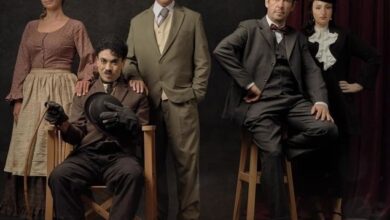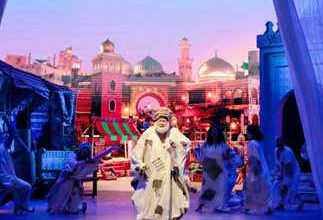Theater director Hany El-Metennawy reprises his adaptation of Eric-Emmanuel Schmitt’s "Oscar and the Lady in Pink" at Rawabet Space for Performing Arts this weekend. A 20-year veteran of el-Hanager theater, El-Metennawy, who previously won the prize for best ensemble cast for the original production "Masks, Cloths and Destinies" at Cairo’s Experimental Theatre Festival in 2003, has been diligently producing this adaptation annually since 2007.
French dramatist Schmitt’s elegiac masterpiece was adapted into colloquial Arabic by actor Mohamed Saleh from a Russian translation in 2006, and subsequently presented by El-Metennawy in April 2007 as part of the Spring Theater Festival at Rawabet in a production starring Saleh and actress Magda Mounir. Successive grants from the Festival of Independent Theater Season and the Young Arab Theater Fund enabled El-Metennawy to reproduce his labor of love in the spring of 2008 and again 2009 in the same performance space.
Al Warsha theater troupe actress Hanan Youssef replaces Mounir in a minimalist, and now self-financed, production where all props and equipment are provided by a volunteer cast and crew. Even the poster is one from an earlier production, the performance dates sheepishly altered with a sticker. The talented team have selflessly reunited for another go-around with the recognition that material this good simply doesn’t come around that often, and that engaging with it–and sharing it with an audience–is often its own reward.
Oscar, a ten-year-old child diagnosed with leukemia, lies in a hospital bed consumed with loneliness and unable to comprehend why his condition hasn’t improved after his operation. Manie-Rose, a hospital volunteer and the title’s lady in pink, enters his life and inspires him with zany and surreal stories of her wrestling escapades. She encourages him to write letters to God where he gets to live ten years each day.
The play centers around these twelve letters, in which Oscar, with a robust and tireless imagination, lives a full life with all its agonies and ecstasies: He grows up, falls in love, suffers the adult pangs of jealousy and heartbreak, gains perspective and gets closer to God, until he eventually sees Him before he passes away–all without ever losing the wonderment that comes with a ten-year-old’s perspective. Mamie-Rose is never too far away, mentoring Oscar through life’s trials with irreverant wit, and upon his passing she’s inspired to write her own letters. The age-old captivating theme here is the endurance of love–eros blossoming in the garden of thanatos.
Dressed in overalls and a striped blue T-shirt, Saleh plays Oscar as a boy, rather than an actor reciting the child’s letters, and his transparent stylization goes down well. Youssef, in pink nursing scrubs, makes brisk entrances and exits in a bare set well-served by the choice of an intimate black box theatre–though given its proximity to the neighborhood’s auto body shops, a certain amount of street clatter has to be tolerated.
The actors deliver most of the story seated on a bench, occasionally sauntering down the aisle that splits the audience and soaks up most of the soft blue and orange lighting scheme. Johann Sebastian Bach’s suites for the solo cello set the mood, and the discrete corners of Rabab Hakem’s striking cartoon artwork, projected against a white backdrop, are explored with a film camera as the images change from one letter to the next. As the audience settles in and this basic setup is accepted, the competent and self-effacing actors allow Schmitt’s engrossing story to take center stage.
With confidence in the power of the material, and supported by their experience from previous performances, the players recognize that the rich and poignant tale of Oscar’s journey is a memorable experience. This production could have been designed as a staged reading, stripped of any theatrical scenery, and the effect would be just as charming and satisfying. With an unfortunately limited run, the play should make for a pleasantly low-key alternative to the usual rambunctious Thursday night options.
"Oscar and the Lady in Pink" by Eric-Emmanuel Schmitt, translated by Mohamed Saleh
Directed by Hany El-Metneway, Artwork: Rabab Hakem
Wednesday 17 and Thursday 18 February, 8:30pm
Rawabet Space for Performing Arts
2 Hussein el-Memar St., off Mohamed Bassiouny St.
Inquiries: 0101774622, 27536861




